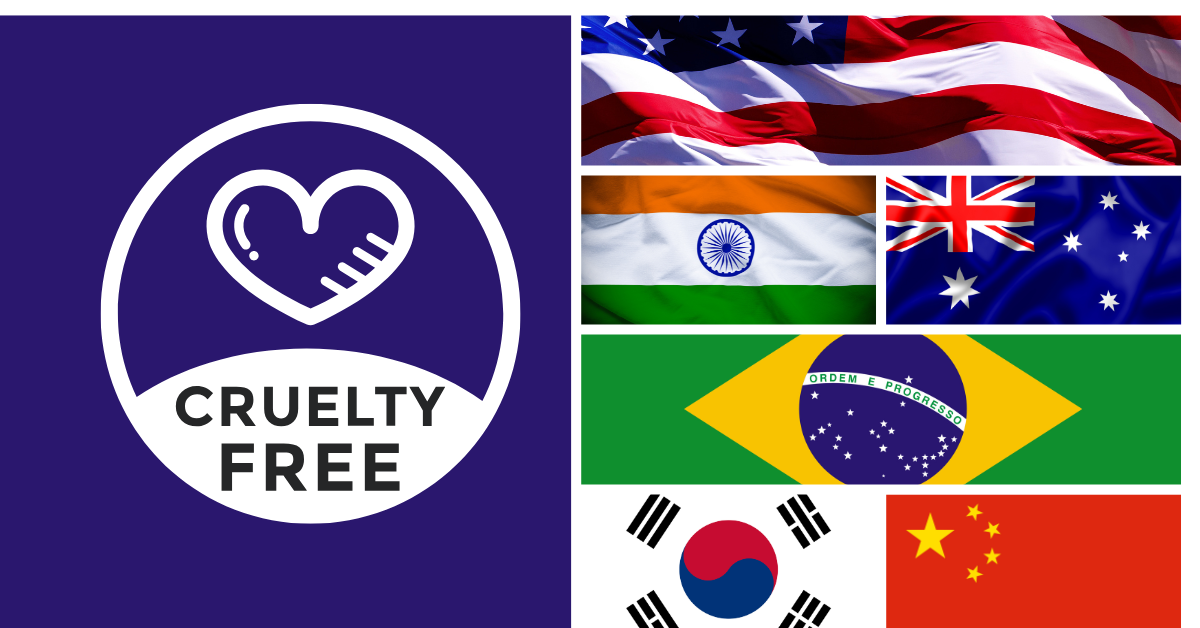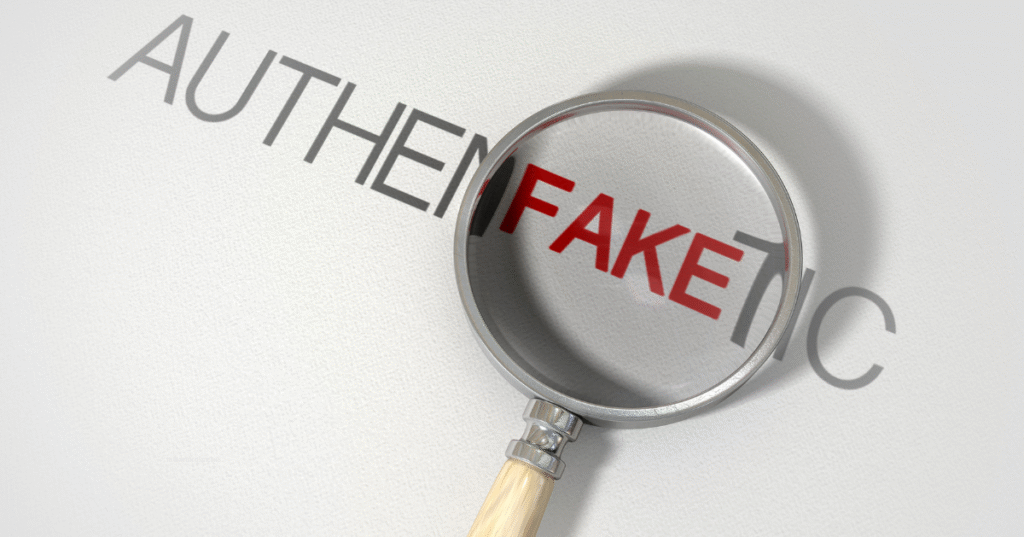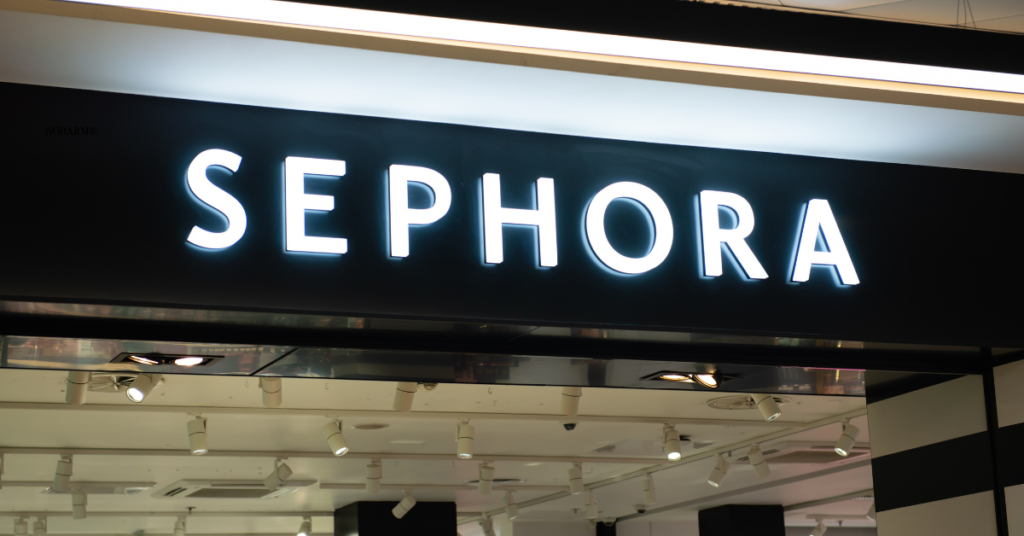The U.S. does not have a nationwide ban on cosmetic animal testing, though many companies choose not to test on animals voluntarily. There are no federal laws that specifically ban cosmetic animal testing or the sale of animal-tested cosmetics.
Here is a listing of countries that have stricter and more comprehensive laws (or regulations) that limit or prohibit cosmetic animal testing.
1. India
– Full Ban on Cosmetic Animal Testing: Since 2013, India has a complete ban on animal testing for cosmetics and their ingredients. Additionally, the country prohibits the importation of cosmetics that have been tested on animals. This makes India’s regulations on cosmetic animal testing more comprehensive than those in the U.S., where no such nationwide ban exists.
2. South Korea
– Ban on Animal Testing for Domestic Cosmetics: Since 2018, South Korea has banned animal testing for domestically produced cosmetics. However, animal testing is still required for some imported cosmetics, though there have been efforts to reduce this. The law in South Korea is stricter than in the U.S. because there are clear and enforceable regulations limiting animal testing in the cosmetic industry.
3. China (Recent Changes)
– No Animal Testing for Some Cosmetics: As of 2021, China has relaxed its requirements for animal testing, exempting some “general cosmetics” (such as shampoos and makeup) from mandatory animal testing. This law applies to both domestically produced and imported cosmetics. While animal testing is still required for certain “special-use” cosmetics (like sunscreen and hair dyes), the reform represents a significant move toward stricter animal testing laws than the U.S., where no such exemptions or national ban exists.
4. Taiwan
– Full Ban on Animal Testing for Cosmetics: Taiwan implemented a ban on animal testing for cosmetics in 2019, and it is now illegal to test cosmetic products on animals or sell products that have been tested on animals. This regulation is stricter than U.S. laws, as there are no federal laws in the U.S. prohibiting cosmetic animal testing.
Countries with Emerging Laws or Stricter Regulations:
– Japan: While Japan does not have a nationwide ban on cosmetic animal testing, there is a growing movement toward reducing animal testing in the country. Several companies are moving toward cruelty-free practices, and there have been calls for more regulation in line with international standards.
– Vietnam: In recent years, Vietnam has also made strides toward reducing animal testing in cosmetics and is moving toward more comprehensive cruelty-free regulations, although this is still an emerging area.
5. The EU
-Full Ban: The EU has one of the strictest and most comprehensive sets of regulations regarding animal testing for cosmetics. Since 2013, the EU has had a complete ban on both the testing of cosmetics and their ingredients on animals. The ban applies not only to products and ingredients developed within the EU but also to cosmetics imported from other countries.
Import Ban: The EU also prohibits the sale of any cosmetics that have been tested on animals, regardless of where the testing occurred.
Commitment to Alternatives: The EU funds significant research into alternative testing methods and has set high standards for validation of alternative methods to ensure animal testing is not needed.
6. Brazil
Brazil introduced a ban on animal testing for cosmetics in 2020. The law prohibits not only the testing of cosmetics on animals but also the sale of products that have been tested on animals.
Commitment to Alternatives: Brazil is working on increasing the use of alternative testing methods, aligning itself with global trends for cruelty-free cosmetics.
7. The United Kingdom (UK)
Full Ban: Since 1998, the UK has had a full ban on animal testing for cosmetics. This includes both the testing of cosmetics and their ingredients on animals, as well as the sale of cosmetics tested on animals.
Post-Brexit: Even after leaving the EU, the UK continues to uphold these regulations, maintaining its ban on animal testing for cosmetics.
Support for Alternatives: The UK also promotes the use of alternative testing methods, contributing to global efforts to end animal testing.
8. Australia
Full Ban: Australia enacted a ban on animal testing for cosmetics in 2020, making it illegal to test cosmetics on animals or sell cosmetics tested on animals.
Regulations: This includes both domestic production and imports, making the law comprehensive and in line with global standards.
Support for Alternatives: Australia is also advancing research into alternative testing methods.
9. New Zealand
Full Ban: New Zealand has had a ban on animal testing for cosmetics since 2015. This applies to both domestic production and the importation of cosmetics tested on animals.
Strict Enforcement: The country has strong enforcement of its laws, ensuring that cosmetics sold in New Zealand are cruelty-free.
10. Taiwan
– Full Ban on Animal Testing for Cosmetics: Taiwan implemented a ban on animal testing for cosmetics in 2019, and it is now illegal to test cosmetic products on animals or sell products that have been tested on animals. This regulation is stricter than U.S. laws, as there are no federal laws in the U.S. prohibiting cosmetic animal testing.
Countries with Emerging Laws or Stricter Regulations:
– Japan: While Japan does not have a nationwide ban on cosmetic animal testing, there is a growing movement toward reducing animal testing in the country. Several companies are moving toward cruelty-free practices, and there have been calls for more regulation in line with international standards.
– Vietnam: In recent years, Vietnam has also made strides toward reducing animal testing in cosmetics and is moving toward more comprehensive cruelty-free regulations, although this is still an emerging area.
Why the U.S. Lags Behind Other Countries in Banning Cosmetic Animal Testing
The United States lags behind other countries in banning cosmetic animal testing due to several factors. Unlike regions like the European Union, India, and Australia, the U.S. lacks federal legislation that outright prohibits animal testing for cosmetics. The FDA does not require or prohibit animal testing, leaving it up to individual companies to decide their practices. Additionally, strong industry lobbying has hindered progress toward stricter regulations, as large corporations resist changes that could impact their testing methods. While some states, like California, have passed laws restricting the sale of cosmetics tested on animals, these efforts are inconsistent and do not provide nationwide protection. Compared to countries where cruelty-free laws are the standard, the U.S. is still behind, though growing public demand for ethical products offers hope for future change.
References:
Humane Society International. (2023). Countries that have banned cosmetic animal testing. Retrieved from https://www.hsi.org
Cruelty Free International. (2016). Korea announces ban on animal testing for cosmetics. Retrieved from https://crueltyfreeinternational.org/latest-news-and-updates/korea-announces-ban-animal-testing-cosmetics
Xu, W. (2021, May 1). China updates regulations on cosmetic animal testing: New exemptions and reforms. ChemLinked. https://cosmetic.chemlinked.com/




